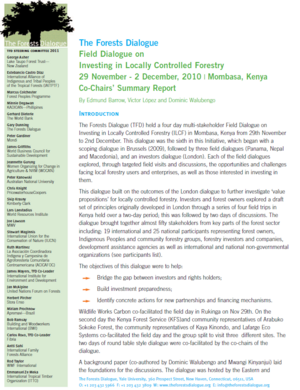Co-Chairs’ Summary: Sixth Dialogue on ILCF - Kenya Field Dialogue
The Forests Dialogue (TFD) held a four day multi-stakeholder Field Dialogue on Investing in Locally Controlled Forestry (ILCF) in Mombasa, Kenya from 29th November to 2nd December. This dialogue was the sixth in this Initiative, which began with a scoping dialogue in Brussels (2009), followed by three field dialogues (Panama, Nepal and Macedonia), and an investors dialogue (London). Each of the field dialogues explored, through targeted field visits and discussions, the opportunities and challenges facing local forestry users and enterprises, as well as those interested in investing in them.
This dialogue built on the outcomes of the London dialogue to further investigate ‘value propositions’ for locally controlled forestry. Investors and forest owners explored a draft set of principles originally developed in London through a series of four field trips in Kenya held over a two-day period; this was followed by two days of discussions. The dialogue brought together almost fifty stakeholders from key parts of the forest sector including: 19 international and 25 national participants representing forest owners, Indigenous Peoples and community forestry groups, forestry investors and companies, development assistance agencies as well as international and national non-governmental organizations (see participants list).
The objectives of this dialogue were to help:
- Bridge the gap between investors and rights holders;
- Build investment preparedness;
- Identify concrete actions for new partnerships and financing mechanisms.
Wildlife Works Carbon co-facilitated the field day in Rukinga on Nov 29th. On the second day the Kenya Forest Service (KFS)and community representatives of Arabuko Sokoke Forest, the community representatives of Kaya Kinondo, and Lafarge Eco Systems co-facilitated the field day and the group split to visit three different sites. The two days of round table style dialogue were co-facilitated by the co-chairs of the dialogue.
A background paper (co-authored by Dominic Walubengo and Mwangi Kinyanjui) laid the foundations for the discussions. The dialogue was hosted by the Eastern and Southern Africa Office of IUCN – the International Union for Conservation of Nature, with the help of the Forest Action Network (FAN) and with financial support provided by the Growing Forest Partnership Initiative, a collaboration between IUCN, the Food and Agriculture Organization of the United Nations (FAO), the International Institute for Environment and Development (IIED), and the World Bank.

